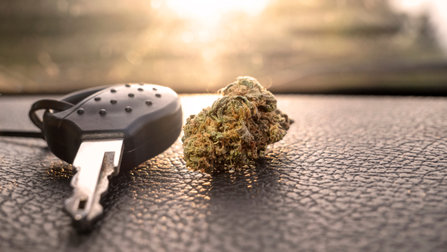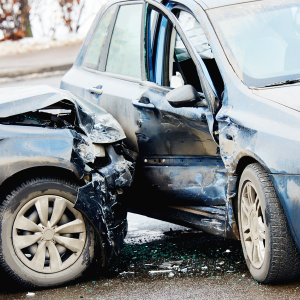The Great Controversy: Is There Really a Connection Between Marijuana Use and Traffic Accidents?

That seems to be a hard question to answer. Individuals, organizations and publications that are pro-marijuana may note increases in traffic accidents after marijuana is legalized but then pooh-pooh those rises. Those who are anti-marijuana publicize pot-related traffic accidents and fatalities far and wide along with warnings for the public. Can we come up with a valid answer? Let’s look at some information related to this problem and see what we find.
Highway Safety Testing
The data I rely on when I want to know if a driver was high on a particular drug is a hazard comes from the National Highway Transportation Safety Administration (NHTSA).
The NHTSA notes the following effects (among others) from the use of marijuana:
- Alterations in perception, cognition and memory
- Disorientation
- Altered time and space perception
- Lack of concentration
- Impaired learning and memory
- Drowsiness and sedation
- Panic attacks
At higher doses:
- More intense reactions
- Fluctuating emotions
- Dulling of attention despite an illusion of heightened insight (that’s an important one!)
- Image distortion (also pretty important!)
Further, the NHTSA analyzed the effects of marijuana on a driver’s performance. They found that marijuana impairs a driver’s performance for approximately three hours after use. The specific types of impairment they found are really the most important part of this report:
- Decreased car handling performance
- Increased reaction times
- Impaired time and distance estimation
- Unintended lateral travel
- Sleepiness
- Motor incoordination
- Impaired sustained vigilance

In one report, the NHTSA notes a great increase in marijuana-impaired drivers on the road. One of their studies found that between 2007 and 2018, the number of weekend nighttime drivers testing positive for THC increased a whopping 48%.
The agency notes that a pot-impaired driver may be able to “pull himself together” for brief periods but the more prolonged and monotonous the driving situation, the worse the impairment can become.
What is your conclusion? How much do you think those effects tend to impair a person’s ability to safely operate a car?
Reports on Marijuana-Related Traffic Accidents
Here’s a summary of some of the recent reports on marijuana-related accidents. Even when these different organizations look at the same state (such as Colorado), their analysis results vary. That might be because of differences in the exact dates of their studies, or the exact traffic phenomenon they were looking at, or the availability of drug tests from those accidents. I invite you to look over this information, do some research of our own and come to your own conclusions.
From the Insurance Institute for Highway Safety (IIHS):
- In 2006 in Colorado, only 6 percent of traffic fatalities involved a driver that tested positive for pot.
- In 2017, 21% of fatalities involved such a driver.
From the Highway Loss Data Institute and IIHS:
These two organizations calculated increases in collision claims after retail sales of marijuana began in Washington, Oregon and Colorado. In the single-state analyses, each state showed a significant increase after retail sales. Considered individually, increases ranged from 4.5 to 13.9 percent.
From a 2019 report in the publication US News and World Report:
Car accidents in Colorado increased 10% after pot was legalized.
A stunning report from France, reported in Forensic Science International:
Blood samples provided information on drugs found in the bodies of under-30 drivers who were killed in traffic accidents in 2003. The most frequently observed drug was cannabis with twenty-nine percent of these drivers testing positive for THC. In 80% of these cases, cannabis was the only drug found.
From a 2019 report from the Rocky Mountain High Intensity Drug Trafficking Area:
Since the legalization of recreational marijuana in Colorado, traffic deaths involving a driver testing positive for pot increased 109%, but Colorado traffic deaths in general only increased 31%.
My Own Experience
About that “impaired time and distance estimation”… I applied my awareness of this effect when I was driving last year in Denver. I was on a busy street with two lanes traveling in either direction. I saw a car at a cross street ahead of me, waiting to cross four lanes of heavy traffic. The driver was staring away from me at the traffic approaching him from the other direction. I was at that moment acutely aware that a person who uses marijuana loses track of time, and I was prepared for him to lose track of how long it had been since he looked in my direction. I watched him closely as I approached.
Sure enough, as I neared the intersection, he began to cross the busy street, with his timing putting him directly in my path. I slowed and sounded my horn. He finally saw me and stopped.

Did I know for sure that he was high? I didn’t. But in the seven weeks I spent in Denver, it was distressingly common to perceive the skunky smell of marijuana drifting by me as I drove or walked. So I knew how many of my neighbors were using the drug. I had also watched my next-door neighbors smoking pot on the porch, with the smoke wafting my way. Then one of them got on his motorcycle and sped away.
I can only conclude that being in an environment in which marijuana is freely and frequently used, I noticed the potential for someone to be distracted in a way that posed a very real danger to me. Unfortunately for families and individuals in states where this drug is legal, this extra-alertness may need to become a habit.
No one wants to lose more people to traffic accidents. That’s why states are struggling to set some kind of standard for how much THC in the blood impairs a driver. And it’s also a struggle to develop accurate tests of a person’s intoxication fast enough before their blood levels drop so much that the test is invalid.
Right now, a measurement of THC in a person’s blood does not always correlate to their level of impairment. But all states have laws that decree that it is illegal to drive while impaired by any substance. That will have to serve until better guidelines and tests can be worked out.
Sources:
- https://www.nhtsa.gov/drug-impaired-driving/understanding-how-marijuana-affects-driving
- https://www.narconon.org/drug-abuse/effects-of-weed.html
- https://www.narconon.org/drug-abuse/marijuana/identifying-abuse.html#weedeffectsmindhttps://www.nhtsa.gov/behavi
- oral-research/2013-14-national-roadside-study-alcohol-and-drug-use-drivers
- https://feeldifferentdrivedifferent.org/1-clear-rule
- https://www.wsp.wa.gov/breathtest/docs/webdms/DRE_Forms/Publications/drug/Human_Performance_Drug_Fact_Sheets-NHTSA.pdf
- https://www.iii.org/sites/default/files/docs/pdf/marijuanaanddui-wp-031119.pdf
- https://www.iihs.org/media/806f7c38-4594-4bbe-82ff-df4a749f5153/9fJfcw/HLDI%20Research/Bulletins/hldi_bulletin_34-14.pdf
- https://rmhidta.org/files/D2DF/FINAL-Volume6.pdf


 ®
®